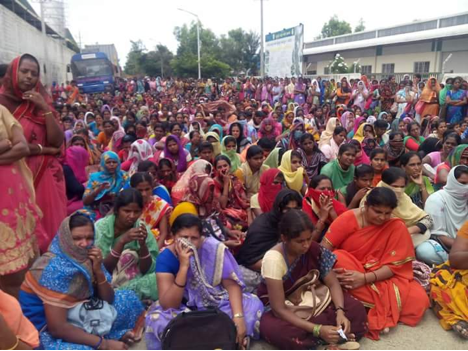Workers of Maddur’s Shahi Exports Complain of Harassment, Walk Out of Factory in Protest

Around 2,000 workers of a unit of Shahi Exports at Maddur in Mandya district, walked out of the factory to protest against the management on June 23, 2018. The protest that was staged demanding minimum wages, brought out the level of harassment that the women working in the factory face.
Shahi exports, Maddur, has more than 5,000 employees. The factory here has many units in one compound; these units are specialised units for stitching, washing, embroidery and knitting. Speaking to Newsclick, Jayaram, one of the union leaders of Garment and Textile Workers Union, present at the site, explained:
“We had planned a protest for minimum wages in Mandya, but the CM had called for a meeting, so we called off the meeting and decided to wait. The workers were not happy with the developments around their minimum wage and the conditions inside the factory. Adding to this was the payment of only Dearness Allowances (DA) without any increment. Every April the workers get DA; however, these companies do not pay them in April but do in May or June along with all the arrears. Shahi Exports in Maddur has paid DA this month, with no increment. All of this together forced the workers to walk out of the factory and protest.”
Also Read: K’taka Garment and Textile Industry Managements Pressurise the Govt to Curb increase in Wages
The top-ranking officials of the management were in attendance at the protest site. The protesting workers made use of this opportunity to explain the incidents of harassment that they go through and the unhygienic working conditions that prevail in the factory. Jayaram noted that the workers complained about, “verbal abuse by the supervisors, unhygienic toilets that are cleaned only when the units are visited by the management, and unavailability of drinking water during the working hours.” He also pointed out that the workers demanded free sanitary pads from the management.
As Divya, a worker in this factory for last four years, speaking to Newsclick, noted, “the Garment factories, in general, employ thousands of women”. Nationally, between 60–80% of the workers are women. The women in the industry are subjected to sexual harassment and other forms of harassment. According to her, Shahi Exports in Maddur alone has employed six thousand women from the villages around Maddur and Mandya and the employees are exploited and harassed by the male colleagues in slightly higher positions. Kavitha Rani, another worker also pointed out that they work under tremendous pressure to reach production targets.
Harassment of women working in Shahi Exports Maddur
A study conducted by Garment Labour Union (GLU) and a local NGO Munnade in 2015-2016 show unprecedented levels of sexual harassment and other kinds of harassment in the workplace in the Garment and Textile industries in Bengaluru-the hub of Garment industry in the South of India. According to this study, 14% of women garment workers in Bengaluru have been raped or forced to commit a sexual act; 75% of garment workers report that there is no functioning complaints procedure in their factory for investigating and punishing cases of sexual harassment or violence; 80% of women garment workers report their health and safety is at risk because of working conditions; 43% of women workers were not given maternity leave; 65% do not believe women garment workers can access justice because they are too poor.
The stories of Divya and Kavitha Rani (names changed to protect from victimisation) working in Shahi Exports Maddur show it is no different in Maddur.
Also Read: Karnataka Garment Workers to Intensify Protests Demanding Wage Revision
Divya started working in the factory in July 2014. She joined in the training batch four years ago. Divya is one of the thousands of workers who are abused in the factory. Divya is the sole bread earner in her family. Her husband left nine years ago and she takes care of her daughter and a son. Her job is the only option she is left with. She noted that since she has joined she has been subjected to verbal abuse and harassment and never retaliated till January 2018; after that, she has been subjected to extreme verbal and physical violence. She narrated:
It became very violent. The torture took extreme turns. They also started to mentally torture me. I would be pushed off the chair. They would hurl abuses at me, would say I am shameless and call me names like donkey, bitch, owl, etc. I still continued to work. Once I was transferred to a different department, the Production in charge in that department misbehaved with me. He asked me why I came to work and said I am shameless. He also asked me to stop working in the factory and instead do sex work on the streets and asked me why do I wear clothes and come to work. He also threatened me to beat me up if he sees me next day in the factory.
Read More: A Struggle for Minimum Wage
I could not take it anymore and approached the HR department to complain about it. The HR did not accept the complaint instead they abused me in return. She warned me not to talk to her as I am uneducated and ask me how did I dare to waste my time by not working and visiting her. Since I approached to complain I was tortured for months together. I was shamed in front of other workers and was not assigned to any work. Since January, until a few days ago, I had no work. It is only from the last few days that I am being allowed to work. This man is also using other supervisors to torture me. All of them verbally abuse always. The union had to come to my rescue. This person has been influencing the other workers into shaming me for complaining against him. They come and give me lectures about how good the man is.
He does the same with every other woman in the factory. He touches them inappropriately and approaches for sexual favours. If women refuse, he starts abusing and torturing them. Not a single woman is spared from this torture.
Read More: Who Would the Garment and Textile Industry Workers in Karnataka Vote for?
Divya also noted that though the women have been complained about in the past, nothing has been done about it. “There are complaint boxes placed in every floor, and many of us have written complaints after complaints, but the head office is not bothered at all.”
Kavitha Rani is working in the embroidery department for last five years. She was also one of the workers who had been protesting last week. Kavitha is a thirty-eight-years-old widow living with her children, mother and her elder brother’s family. She travels every day in the morning on a bus, or auto or some tempo to the factory. She had to quit her job, as she was unable to bear the production torture that she was subjected to. After her friends insisted that she should again start working in the factory, she joined as a helper in the embroidery department and now she is working as an operator in the department. Kavitha said that the production torture in the factory is unbearable and verbal abuse -- hurling sexual language at the workers is a routine.
Kavitha said,
“Workers in our department are also abused every day. If we ask for something, as basic as warm water to drink in the canteen, we are abused. They keep asking us to quit the job in the factory and buy some cattle and work as an agricultural labourer. We at the embroidery department do not keep quiet -- we ask them to give us loans for buying cattle. They know we are not the kinds who would bear everything and anything. The conditions in other departments are worst. Production torture is too much. Workers do not even take lunch breaks. If we ask them why they have not taken a break, they usually ask us to shut up, by saying they haven’t met production targets. All the workers come from a similar background. It is very common to hear workers lamenting about the conditions that are forcing them to work in the factory. ‘If our husbands were on the right path, why would we have to see these days?’ Some ask.”
The committee to study “long-pending issues” of the garment workers
The Chief Minister of Karnataka, H D Kumaraswamy has directed the formation of a committee involving labour department officials, textile manufacturers, central trade unions, and garment workers. The committee is said to study the “long-pending issues” of the garment workers including the minimum wage. The Garment and Textile industry workers in Karnataka are protesting for a revision in the minimum wage.
There have been many reports and studies that have indicated existing violence and harassment in the workplace in the Garment Industry. India’s garment industry operates in the informal sector and remains poorly regulated, resulting in a lack of legally binding employer relationships, limited or no legal protection for workers, a lack of trade union protection and collective bargaining, denial of employment-related benefits and very few functioning grievance mechanisms. This has left the workers to face a vicious nexus of management, police and politicians. As Divya and Kavitha Rani observed, often the workers who complain are targeted. Jayaram noted that the company never fire the workers, but they keep transferring from one department to the other.
These frequent transfers do not let the workers get accustomed to the department that they are newly posted to. Thus they mostly are unable to fulfil their production targets and this gives the management an excuse to harass them.
One has to wait and see if the committee formed by the CM would take into consideration the narratives of the workers in the Garment and Textile industry. Jayaram and Divya noted that the functioning sexual harassment cell should be set up with the union members in the cell.
Also Read: Women Workers in Garment Factories of Walmart, Other Brands Face Violence Daily: Report
Get the latest reports & analysis with people's perspective on Protests, movements & deep analytical videos, discussions of the current affairs in your Telegram app. Subscribe to NewsClick's Telegram channel & get Real-Time updates on stories, as they get published on our website.
























